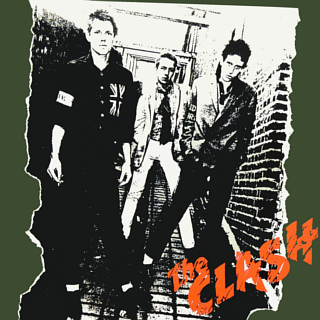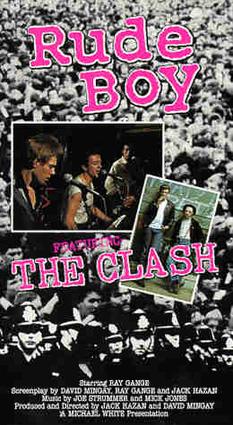
The Clash were an English rock band that formed in London in 1976 and were key players in the original wave of British punk rock. Billed as "The Only Band That Matters", they used elements of reggae, dub, funk, ska, and rockabilly, and they contributed to the post-punk and new wave movements that followed punk. For most of their recording career, the Clash consisted of lead vocalist and rhythm guitarist Joe Strummer, lead guitarist and vocalist Mick Jones, bassist Paul Simonon, and drummer Nicky "Topper" Headon.

John Graham Mellor, known professionally as Joe Strummer, was a British musician. He was the co-founder, lyricist, rhythm guitarist, and lead vocalist of punk rock band the Clash, formed in 1976. The Clash's second studio album, Give 'Em Enough Rope (1978), reached No. 2 on the UK charts. Soon after, they achieved success in the US, starting with London Calling (1979) and peaking with Combat Rock (1982), which reached No. 7 on the US charts and was certified 2× platinum there. The Clash's explosive political lyrics, musical experimentation, and rebellious attitude greatly influenced rock music in general, especially alternative rock. Their music incorporated reggae, ska, dub, funk, rap, and rockabilly.
Terence Chimes is an English musician, best known as the original drummer of punk rock group The Clash. He played with them from July 1976 to November 1976, January 1977 to April 1977, and again from May 1982 to February 1983 both preceding and succeeding his replacement Topper Headon. Chimes also drummed for Generation X from 1980 to 1981, Hanoi Rocks in 1985, and Black Sabbath from 1987 to 1988. In 2003, he was inducted into the Rock and Roll Hall of Fame as a member of The Clash.

The Clash is the debut studio album by the English punk rock band the Clash, released on 8 April 1977 through CBS Records. Recorded and mixed over three weeks in February 1977 for £4,000, it would go on to reach No. 12 on the UK charts, and has been included on many retrospective rankings as one of the greatest punk albums of all time.

Give 'Em Enough Rope is the second studio album by the English punk rock band the Clash, released on 10 November 1978 through CBS Records. It was their first album released in the United States, preceding the US version of the self-titled studio album. The album was well received by critics and fans, peaking at number two in the United Kingdom Albums Chart, and number 128 in the Billboard 200. The album is tied with Combat Rock (1982) for being the highest-charting album for the Clash in their native United Kingdom.

Paul Gustave Simonon is an English musician and artist best known as the bassist for the Clash. More recent work includes his involvement in the supergroup the Good, the Bad & the Queen and playing on the Gorillaz album Plastic Beach in 2010, which saw Simonon reunite with The Clash guitarist Mick Jones and Blur frontman Damon Albarn – and which also led to Simonon becoming the live band's touring bassist for Gorillaz's Escape to Plastic Beach Tour. Simonon is also an established visual artist.
The 101ers were a pub rock band from the 1970s playing mostly in a rockabilly style, notable as being the band that Joe Strummer left to join The Clash. Formed in London in May 1974, the 101ers made their performing debut on 7 September at the Telegraph pub in Brixton, under the name 'El Huaso and the 101 All Stars'. The name would later be shortened to the '101 All Stars' and finally just the '101ers'. The group played at free festivals such as Stonehenge, and established themselves on the London pub rock circuit prior to the advent of punk.

Nicholas Bowen "Topper" Headon is an English drummer and multi-instrumentalist, best known as the drummer of punk rock band The Clash. Known for his contributions to the drumming world, Headon was inducted in the Rock and Roll Hall of Fame with the rest of The Clash in 2003.

Michael Geoffrey Jones is a British musician, singer, songwriter, and record producer best known as the co-founder of the Clash, and as that group's guitarist until 1983. In 1984, he formed Big Audio Dynamite with Don Letts. Jones has played with the band Carbon/Silicon along with Tony James since 2002 and was part of the Gorillaz live band for a world tour in 2010–2011. In late 2011, Jones collaborated with Pete Wylie and members of the Farm to form the Justice Tonight Band.

The Singles is a compilation album by the English punk rock band the Clash. It includes all of the band's singles, in their original single versions, except for 1977's Capital Radio and 1985's "This Is England", due to its parent album, Cut the Crap (1985), being disowned by the band at that time.

"(White Man) In Hammersmith Palais" is a song by the English punk rock band the Clash. It was originally released as a 7-inch single, with the b-side "The Prisoner", on 16 June 1978 through CBS Records.

"Complete Control" is a song by The Clash, released as a 7" single and featured on the U.S. release of their debut album.
"Police and Thieves" is a reggae song first recorded by the falsetto singer Junior Murvin in 1976. It was covered by the punk band The Clash and included on their self-titled debut album released in 1977.

Rude Boy is a 1980 British film directed by Jack Hazan and David Mingay and filmed in 1978 and early 1979.
Bernard Rhodes is a designer, band manager, studio owner, record producer and songwriter who was integral to the development of the punk rock scene in the United Kingdom from the middle 1970s. He is most associated with two of the UK's best known and influential punk bands, the Sex Pistols and The Clash. According to John Lydon, Rhodes was responsible for discovering him in the Kings Road and arranging the audition which led to his joining the Sex Pistols. Rhodes introduced Joe Strummer to Mick Jones and Paul Simonon, who with Keith Levene then formed The Clash.
"I'm So Bored with the U.S.A." is a song by British punk rock band the Clash, featured on their critically acclaimed 1977 debut album, which was released in the United States in July 1979 as their second album after Give 'Em Enough Rope. It was the album's third track in the original version and second in the US version.

"Clash City Rockers" is a song by English rock band the Clash. It was first released in February 1978 as a single with the B-side "Jail Guitar Doors", the latter a re-worked version of a song from Joe Strummer's pub rock days. "Clash City Rockers" was the second of three non-album singles released between the group's eponymous first album in 1977 and their second album, Give 'Em Enough Rope (1978). It was later included as the opening track of the belated US version of the band's debut album.
Capital Radio is a song and an extended play by the English punk rock band the Clash. The original song has been included as "Capital Radio" or "Capital Radio One" on the Capital Radio EP (1977), Black Market Clash (1980), The Story of the Clash, Volume 1 (1988), Clash on Broadway (1991), From Here to Eternity: Live (1999), The Essential Clash (2003), and Singles Box (2006).
The Clash were an English rock band that formed in 1976 as part of the original wave of British punk rock. Along with punk rock, they experimented with reggae, ska, dub, funk, rap and rockabilly. For most of their recording career, The Clash consisted of Joe Strummer, Mick Jones, and Paul Simonon, with Terry Chimes or Nicky "Topper" Headon on drums and percussion. The band features in several documentaries and other films.
"Garageland" is a song by English punk rock band The Clash featured as the final track for their 1977 debut album The Clash.











